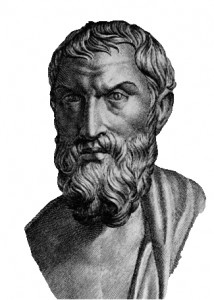“Our Canon Is:”
 [Edit 06/20/15: This post probably needs revision. I have come to question whether Hicks’ translation of this line is accurate and this needs to be checked.]
[Edit 06/20/15: This post probably needs revision. I have come to question whether Hicks’ translation of this line is accurate and this needs to be checked.]
“Our canon is that direct observation by sense and direct apprehension by the mind are alone invariably true.”
– Epicurus to Herodotus, Book X Diogenes Laertius, Loeb Edition translated by R.D. Hicks.
– “Our canon is…” Epicurus left to us a clear standard for separating that which is true from that which is not. Do we always apply this in our lives, and do we use this as our starting point for our thoughts on all subjects ?
– “direct observation by sense…” Do we require that our opinions be grounded in direct sense perception of reality, or do we allow our minds to follow flights of fancy that contradict realities that our senses perceive?
– “direct apprehension by the mind” Do we focus our minds to grasp the full meaning of those things that we perceive and conceptualize? Do we understand what it is that words denote so that we may test our opinions, or do we allow our proofs to run on ad infinitum, and our terms to be empty of meaning?
– “…alone invariably true.” Do we appreciate that some things are “invariably true” and some are not, or do we flop around like academics who say that all things are merely “probable”?

